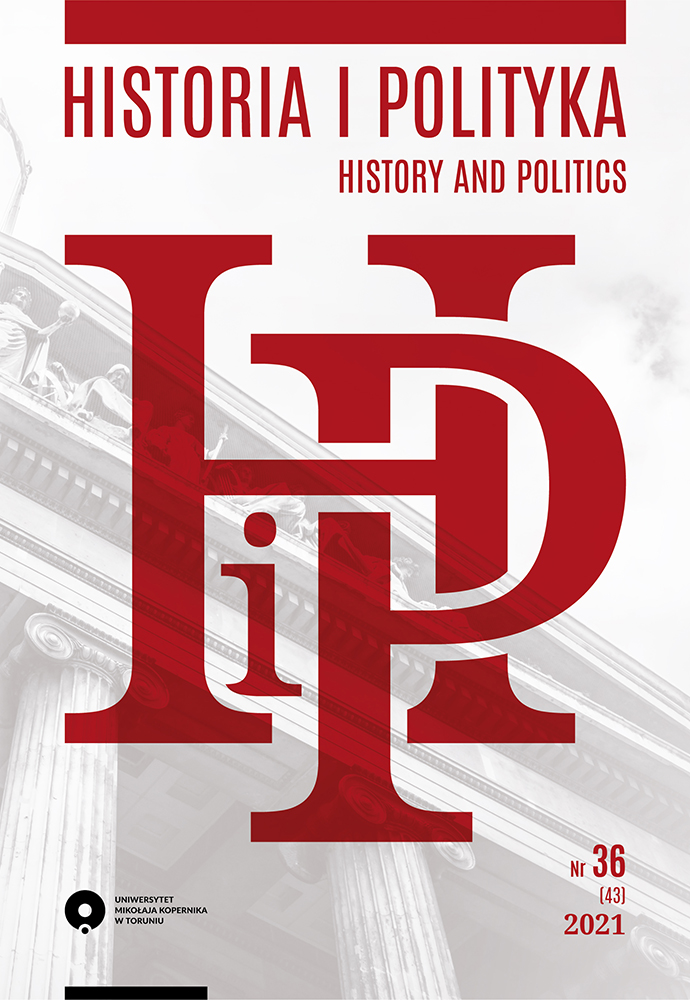Economic and Political Reconstruction and Development of FRG in the Period after World War II
DOI:
https://doi.org/10.12775/HiP.2021.018Keywords
FRG, occupation zones, “economic miracle”, industry and agriculture, Erhard’s reform, economic growth and development, social market economy, Marshall Plan, economic fluctuationsAbstract
In the first post-war years, the policy of the Western occupying powers towards Germany was aimed at preventing the economic revival of their former formidable competitor. As a result of these efforts, West Germany rebuilt its economy to the pre-war level later than Great Britain or France. The undoubted shift in the economic development of West Germany began in mid-1948. The impetus for the rapid growth of industrial production was the monetary reform carried out by the Western occupying powers, as well as the inflow of funds under the Marshall Plan. The monetary reform carried out in June 1948 favoured the strengthening of the financial market and was an incentive to invest. The influx of capital under the Marshall Plan had a similar impact on the West Germany’s economy during this period. The western zones of Germany played a special role in this plan. The United States, striving to strengthen its position in these zones as much as possible and use them as a strategic base (aimed, inter alia, against the communist bloc), provided West Germany with a sum of loans and subsidies significantly exceeding the amount of aid provided to other Western European countries. An extremely serious burden for the Western occupation zones was the influx of refugees from neighbouring areas (a total of about 10 million people) and the need to maintain the occupation troops, which directly led to a huge deficit in food resources. Agricultural production fell and ranged only from 66% to 75% of the pre-war production level.
References
Abelshauser, W. (2004). Deutsche Wirtschaftsgeschichte seit 1945. Bonn: Bundeszentrale für politische Bildung.
Błahut, K. (1992). Elementy polityki gospodarczej Niemiec. Wrocław: Wydawnictwo Uniwersytetu Wrocławskiego.
Bossak, J. (2008). Instytucje, rynki i konkurencja we współczesnym świecie. Warszawa: Szkoła Główna Handlowa.
Cameron, R., & Neal, L. (2010). Historia gospodarcza świata. Od paleolitu do czasów najnowszych. Wrocław: Książka i Wiedza.
Cowen, T. (1985). The Marshall Plan: Myths and Realities. In: D. Bandow (Ed.). U.S. Aid to the Developing World: A Free Market Agenda (pp. 61–74). Washington: Heritage Foundation.
Deutsches Geld- und Bankwesen in Zahlen, 1876–1975 (1977). Frankfurt/Main: Deutsche Bundesbank.
Erhard, L. (2012). Dobrobyt dla wszystkich. Warszawa: Polskie Towarzystwo Ekonomiczne.
Gedymin, O. (1999). Strategie gospodarcze i drogi rozwoju. II Rzeczpospolita, powojenne Niemcy, Tajwan, Chile. Białystok: Wyższa Szkoła Finansów i Zarządzania w Białymstoku.
Gedymin, O. (2002). Kapitalizm niemiecki. Szkice o genezie, rozwoju i teraźniejszości. Białystok: Wyższa Szkoła Finansów i Zarządzania w Białymstoku.
Grimm, K. (1992). Socjalna gospodarka rynkowa w RFN. Koncepcja, rozwój, problematyka. Warszawa: Fundacja im. Friedricha Eberta.
Gruenig, F., & Krengel, R. (1955). Die Expansion der westdeutschen Industrie 1948–1954. West Berlin: Duncker & Humbolt.
Kaczmarek, T., & Pysz, P. (2004). Ludwig Erhard i społeczna gospodarka rynkowa. Warszawa: ISP PAN.
Kowalik, T. (2000). Współczesne systemy ekonomiczne. Powstawanie, ewolucja, kryzys. Warszawa: Wydawnictwo Wyższej Szkoły Przedsiębiorczości i Zarządzania im. Leona Koźmińskiego.
Kowalik, T. (2005). Systemy gospodarcze. Efekty i defekty reform i zmian ustrojowych. Warszawa: Fundacja Innowacja.
Lewandowski, J. (1991). Neoliberałowie wobec współczesności. Gdynia: Atext.
Moszyński, M. (2012). Transformacja systemowa wschodnich Niemiec w perspektywie „cudu gospodarczego” Ludwiga Erharda. Toruń: UMK.
Sinn, G., & Sinn, H.W. (1991). Kaltstart-volkswirtschaftliche Aspekte der deutschen Vereinigung. Tuebingen: J.C.B. Mohr (Paul Siebeck).
Thieme, M.J. (1995). Społeczna gospodarka rynkowa. Warszawa: Wydawnictwo C.H. Beck.
Tomala, M. (1979). Gospodarka RFN wczoraj, dziś i jutro. Warszawa: Państwowe Wydawnictwo Ekonomiczne.
Wagner, A. (1972). Die Wachstumszyklen in der Bundesrepublik Deutschland. Eine komparativ-dynamische Komponentenanalyse fuer die Jahre 1951–1970. Tuebingen: J.C.B. Mohr (Paul Siebeck).
Wallich, H.C. (1955). Triebkräfte des deutschen Wiederaufstiegs. Frankfurt/Main: Fritz Knapp.
Wawro, J. (2012). Społeczna gospodarka rynkowa. Recepta na kryzys. Jarosław–Rzeszów: Galicea Publishers.
Wielka historia świata. Vol. 11 (2006). Kraków: Fogra Oficyna Wydawnicza.
Downloads
Published
How to Cite
Issue
Section
License
Copyright (c) 2021 Mariusz Janik

This work is licensed under a Creative Commons Attribution-NoDerivatives 4.0 International License.
Nicolaus Copernicus University fully respects the right to privacy and protection of personal data of all authors. The authors’ personal data is not used for commercial and/or marketing purposes.Stats
Number of views and downloads: 1043
Number of citations: 0



